CLICK ON THE L/R ARROWS TO ADVANCE
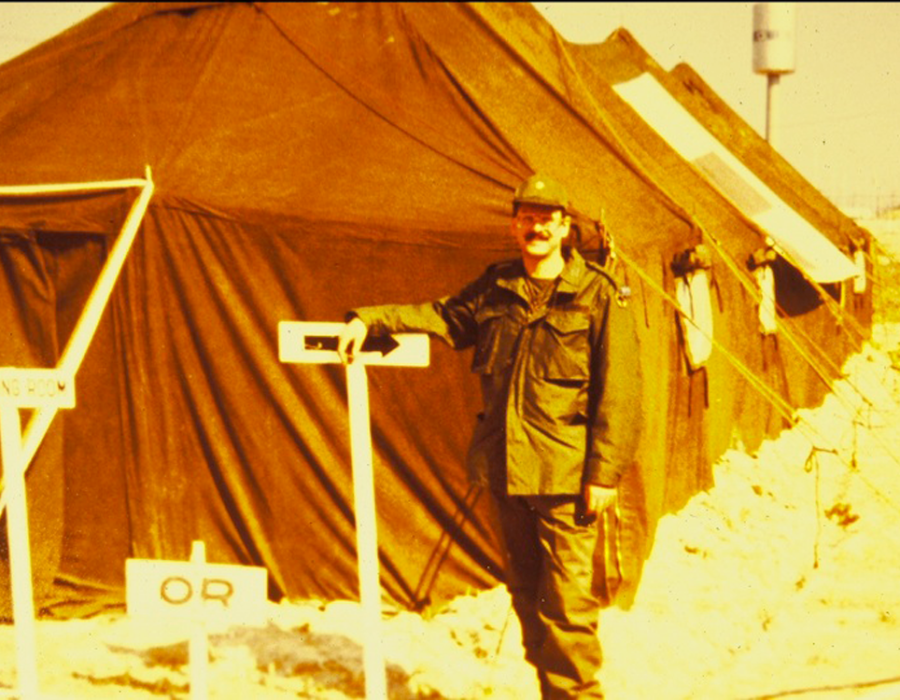 Dr. Mueller's introduction to Asia was a two-year tour in Seoul, Korea, as a US Army general, thoracic and vascular surgeon. The 4077th MASH unit was still active and ready for combat.
Dr. Mueller's introduction to Asia was a two-year tour in Seoul, Korea, as a US Army general, thoracic and vascular surgeon. The 4077th MASH unit was still active and ready for combat.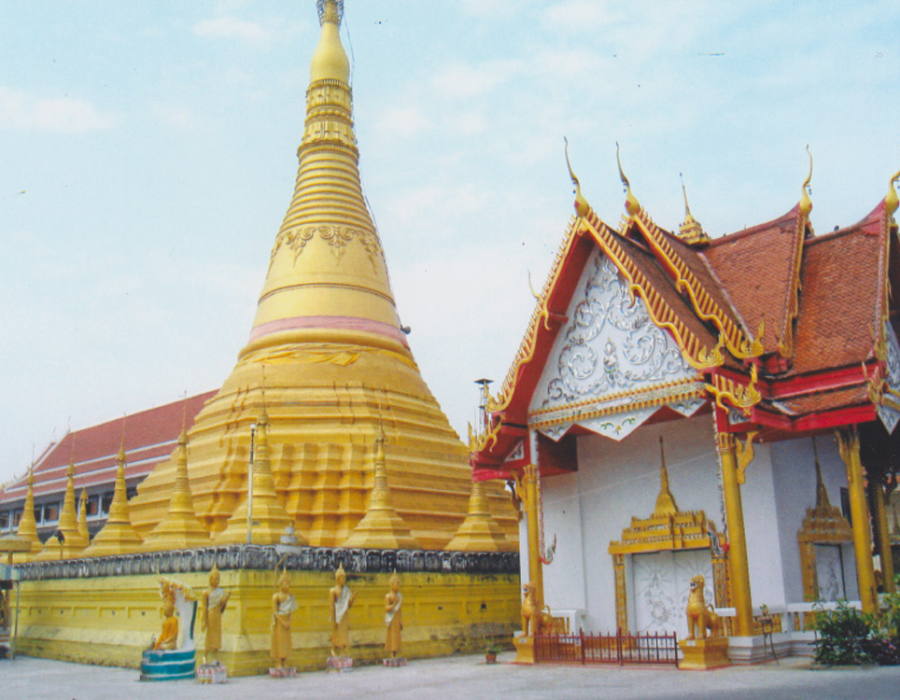 He arrived in northern Thailand in 1992 on a surgical medical mission trip.
He arrived in northern Thailand in 1992 on a surgical medical mission trip.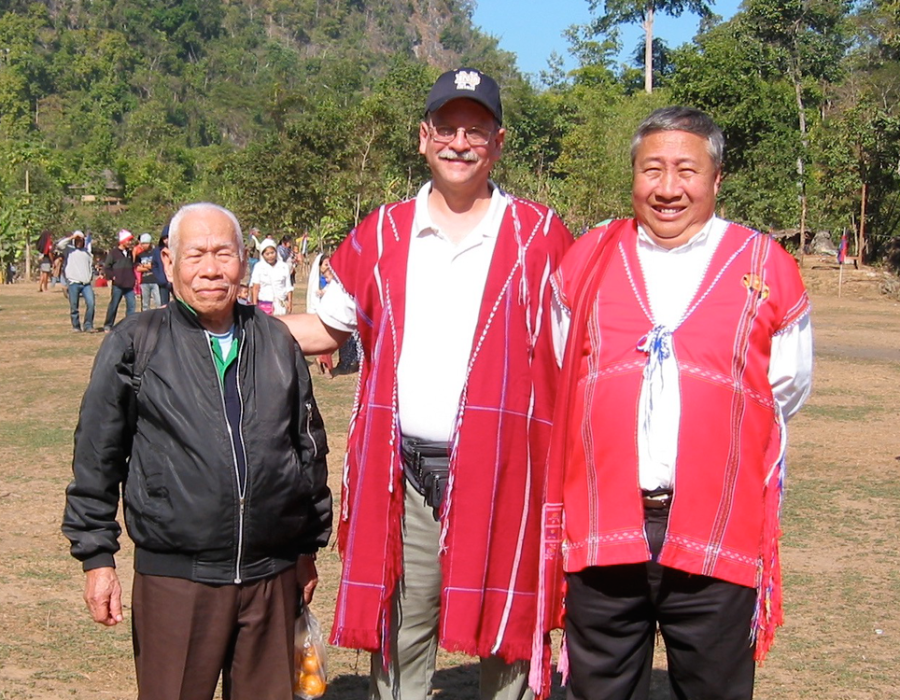 Through an unexpected meeting with leaders of the Karen hill tribe from Burma, Dr. Mueller learned of the brutal ethnic cleansing campaign directed against minority hill tribe members that resulted in over a million internally displaced persons inside Burma and refugees seeking safety in Thailand. The Karens were desperate for any assistance as their cause had been all but ignored by the world. Many were Christian and spoke English well.
Through an unexpected meeting with leaders of the Karen hill tribe from Burma, Dr. Mueller learned of the brutal ethnic cleansing campaign directed against minority hill tribe members that resulted in over a million internally displaced persons inside Burma and refugees seeking safety in Thailand. The Karens were desperate for any assistance as their cause had been all but ignored by the world. Many were Christian and spoke English well.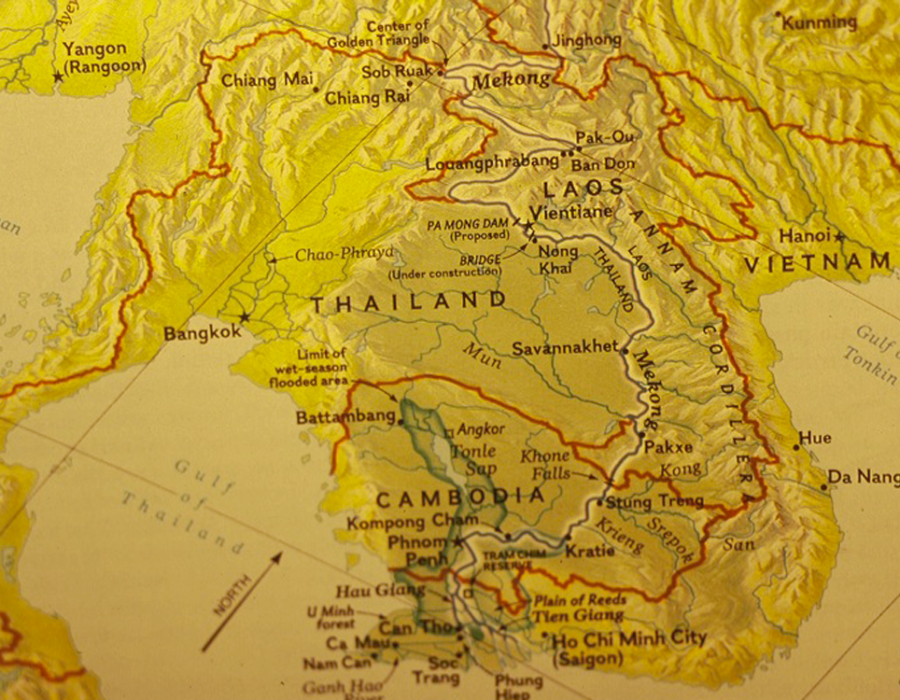 The Karen's only hospital, located due west of Chiang Mai on the Thai Burmese border, was in desperate need of the medical supplies that Dr. Mueller had brought. The Karens offered him an escorted trip there.
The Karen's only hospital, located due west of Chiang Mai on the Thai Burmese border, was in desperate need of the medical supplies that Dr. Mueller had brought. The Karens offered him an escorted trip there.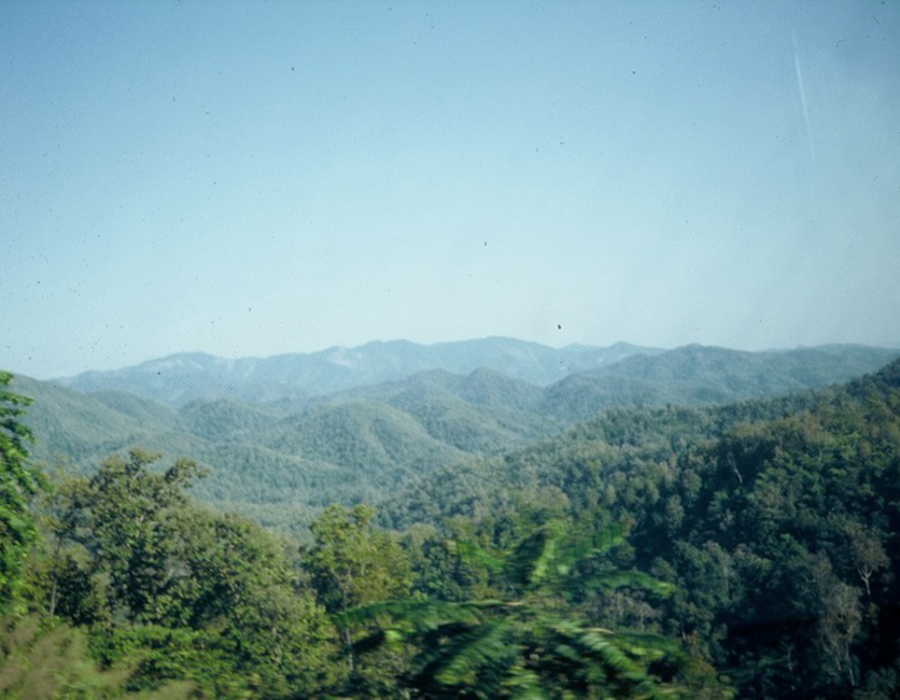 The two-day journey to the remote border required a pickup truck ride through scenic tropical forested mountains without paved roads or tourists.
The two-day journey to the remote border required a pickup truck ride through scenic tropical forested mountains without paved roads or tourists.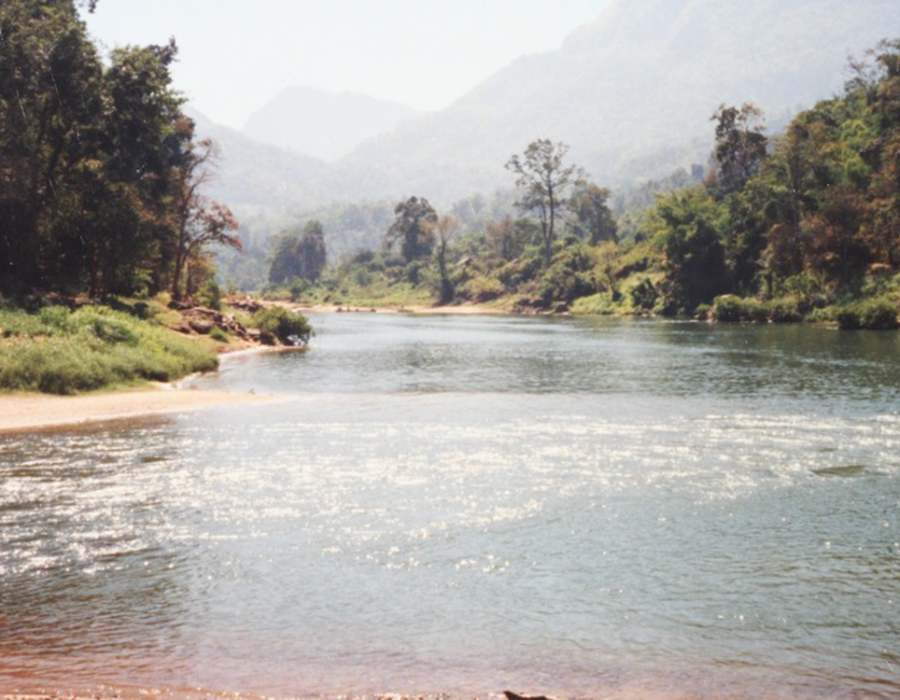 The Salween and Moei Rivers defined the international boundary. The Karen headquarters and hospital were a three-hour boat ride south.
The Salween and Moei Rivers defined the international boundary. The Karen headquarters and hospital were a three-hour boat ride south.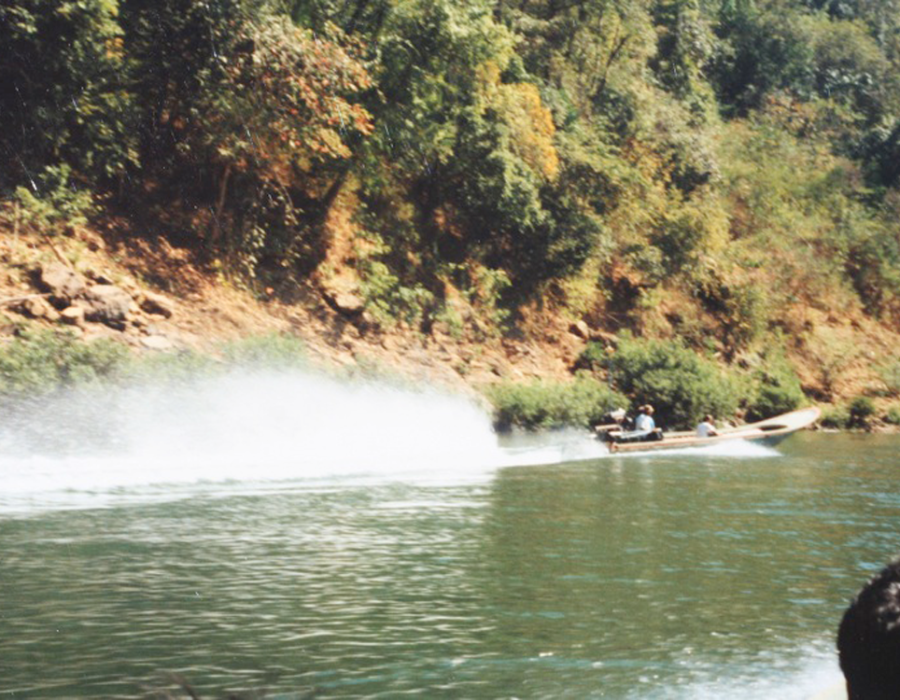 Traditional Thai long-tail boats flew down the river like speedboats with huge rooster tail wakes and no mufflers.
Traditional Thai long-tail boats flew down the river like speedboats with huge rooster tail wakes and no mufflers.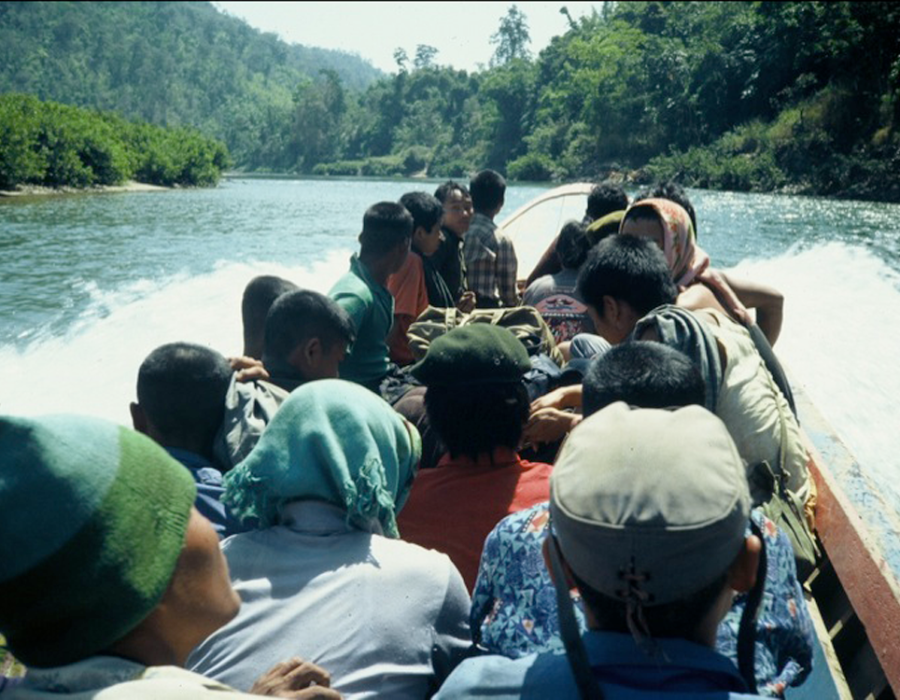 All available space was usually put to use on the river boat buses, while the open air seating allowed a continuous fresh breeze and dazzling scenery eliminated any cramped feelings.
All available space was usually put to use on the river boat buses, while the open air seating allowed a continuous fresh breeze and dazzling scenery eliminated any cramped feelings.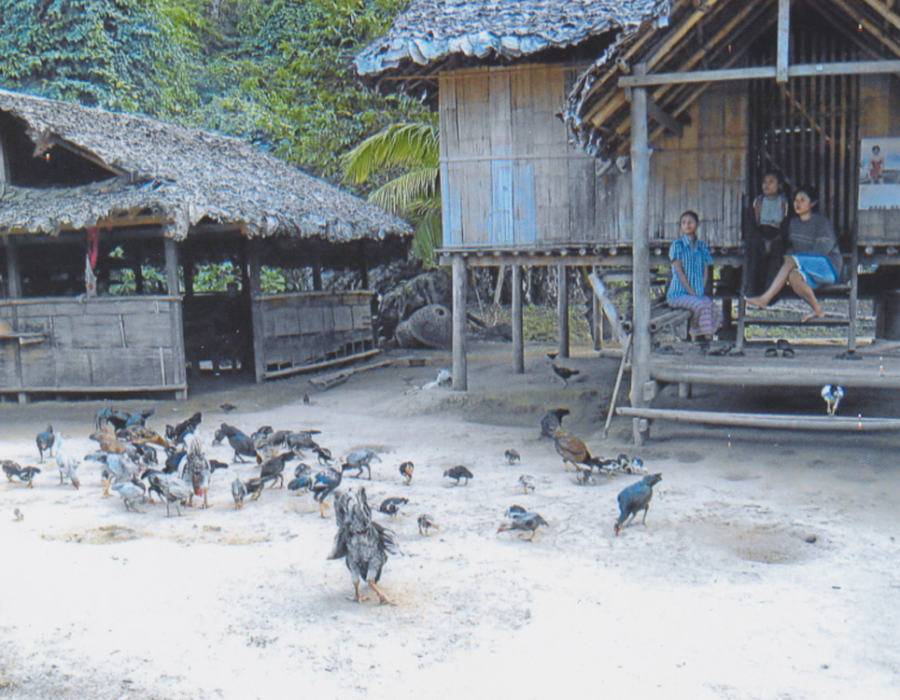 Karen village homes were simple: bamboo framing, floors, and walls with a waterproof thatched-leaf roof. Chickens were ubiquitous in established villages.
Karen village homes were simple: bamboo framing, floors, and walls with a waterproof thatched-leaf roof. Chickens were ubiquitous in established villages.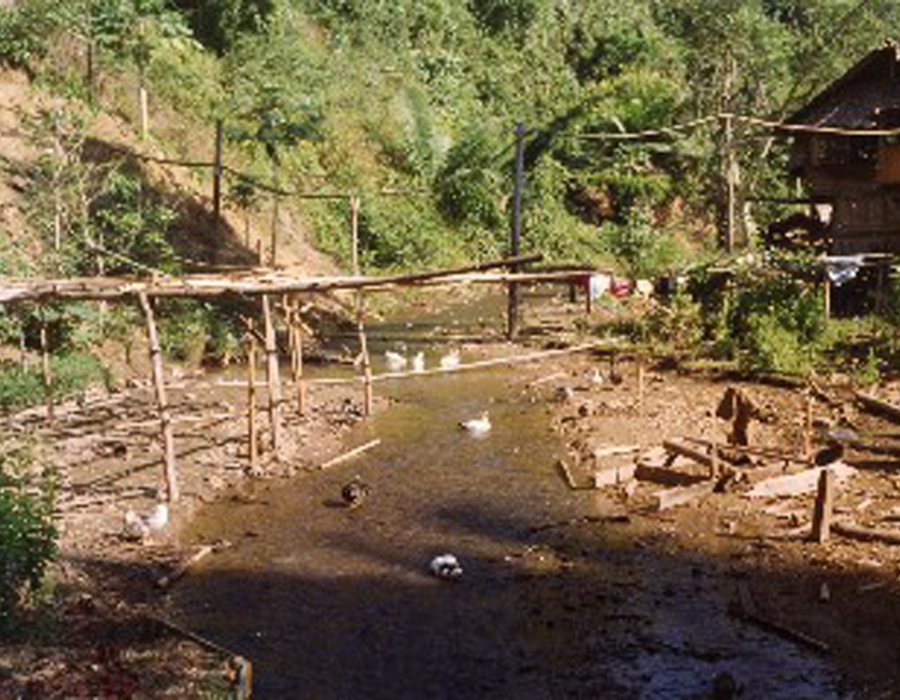 Jungle villages had ready access to a source of clean water, usually a stream.
Jungle villages had ready access to a source of clean water, usually a stream.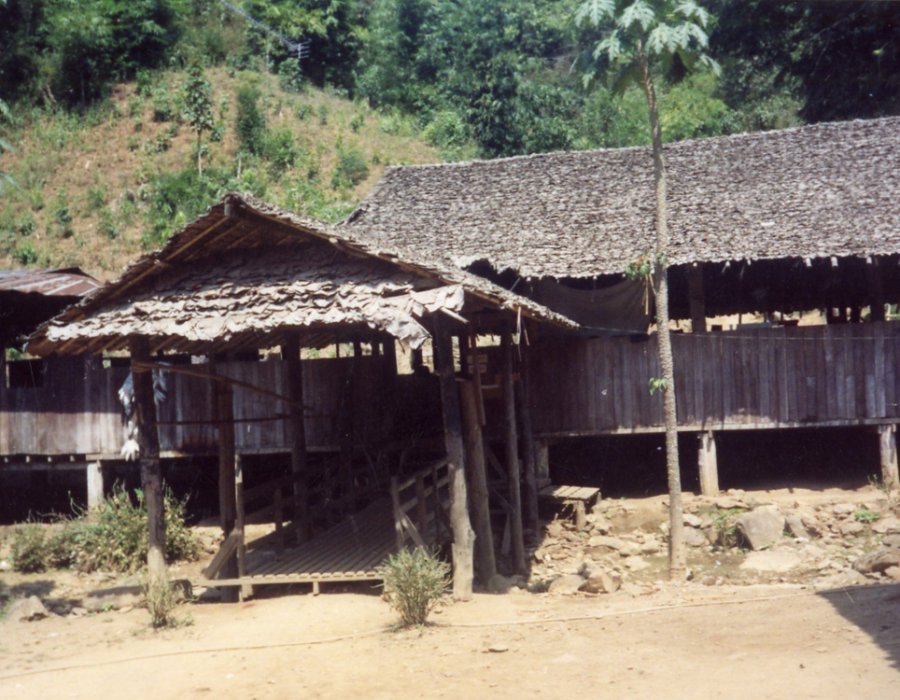 Final destination, the Karen National Liberation Army's Hospital, Htoo Wah Loo, Kawthoolei, Burma, serving both Karen soldiers wounded while defending their homeland along with sick and injured civilians.
Final destination, the Karen National Liberation Army's Hospital, Htoo Wah Loo, Kawthoolei, Burma, serving both Karen soldiers wounded while defending their homeland along with sick and injured civilians.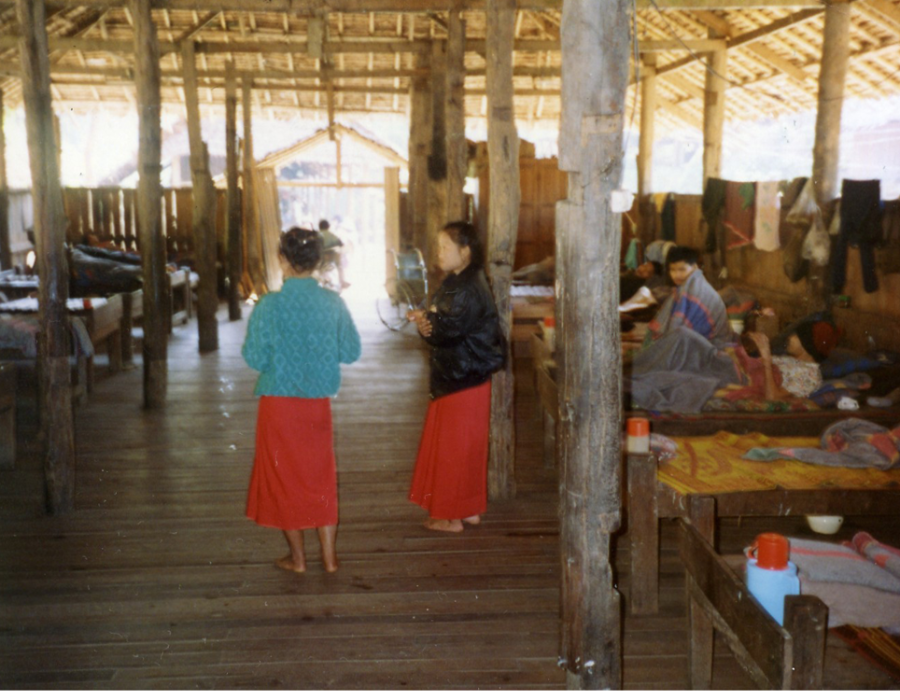 The hospital was well organized with a competent nursing staff that made the most of limited medicines and supplies.
The hospital was well organized with a competent nursing staff that made the most of limited medicines and supplies.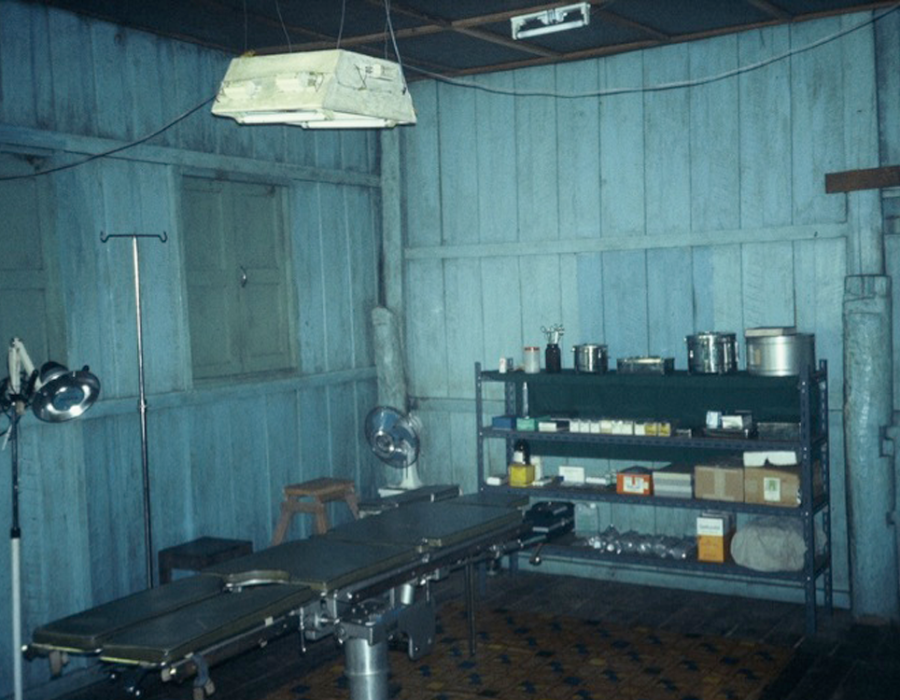 The single operating room had a rusted nonadjustable OR table and fishing line for suture. Visits and resupply by fully trained Western surgeons were rare, and the few local surgeons operated at better equipped urban hospitals. Dr. Mueller quickly realized that much suffering could be alleviated with simple modern surgery. Apparently, only a few foreign physicians but no major international medical aid groups had adopted or even shown an ongoing interest in helping the Karens to resupply and update their only hospital.
The single operating room had a rusted nonadjustable OR table and fishing line for suture. Visits and resupply by fully trained Western surgeons were rare, and the few local surgeons operated at better equipped urban hospitals. Dr. Mueller quickly realized that much suffering could be alleviated with simple modern surgery. Apparently, only a few foreign physicians but no major international medical aid groups had adopted or even shown an ongoing interest in helping the Karens to resupply and update their only hospital.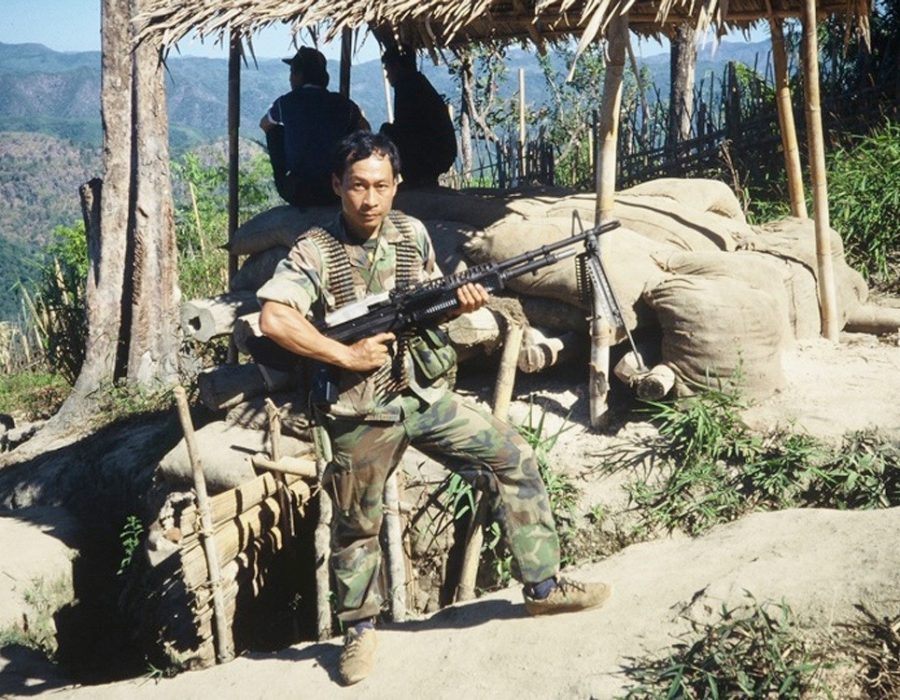 Since the early 1960's, the Burmese Army had been attempting to annihilate or enslave the minority hill tribes like the Karens, enabling the exploitation and environmental destruction of their virgin-forested mountainous homelands. Unfortunately for the Burmese Army, the hill tribes formed armies and fought back.
Since the early 1960's, the Burmese Army had been attempting to annihilate or enslave the minority hill tribes like the Karens, enabling the exploitation and environmental destruction of their virgin-forested mountainous homelands. Unfortunately for the Burmese Army, the hill tribes formed armies and fought back.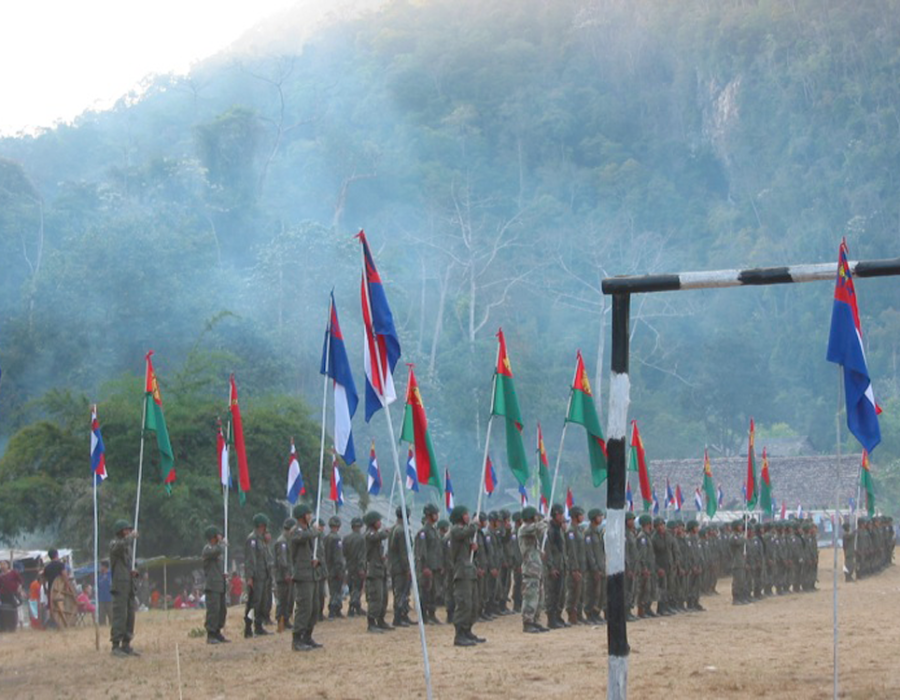 The Karen National Liberation Army numbered over 10,000 soldiers when Dr. Mueller arrived in 1992.
The Karen National Liberation Army numbered over 10,000 soldiers when Dr. Mueller arrived in 1992.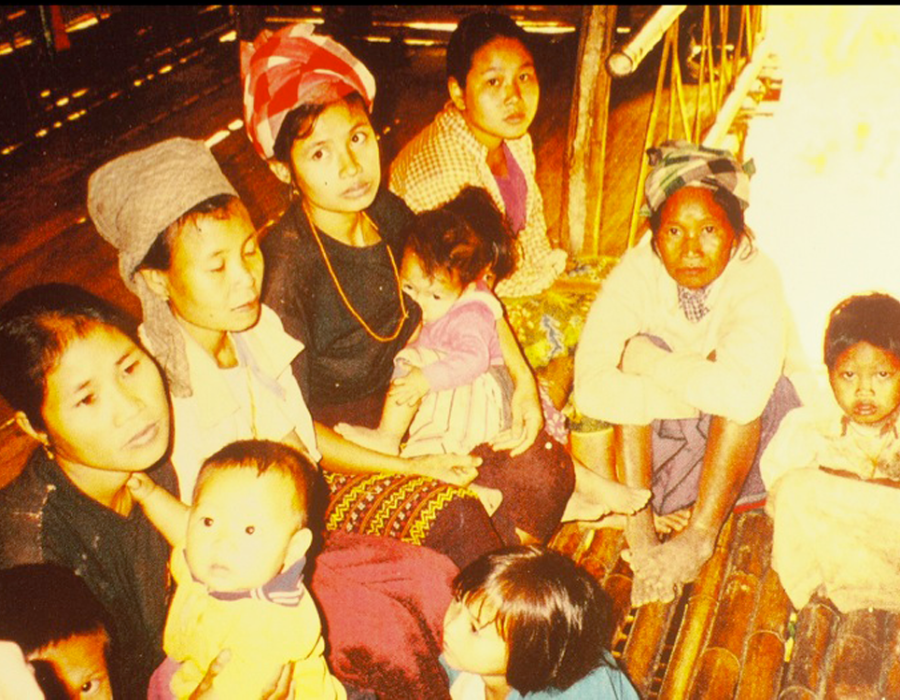 Once their villages were attacked, destroyed and seeded with landmines, the now homeless surviving Karens streamed toward the border in search of either a more secure location to rebuild their village or a Thai refugee camp across the border.
Once their villages were attacked, destroyed and seeded with landmines, the now homeless surviving Karens streamed toward the border in search of either a more secure location to rebuild their village or a Thai refugee camp across the border.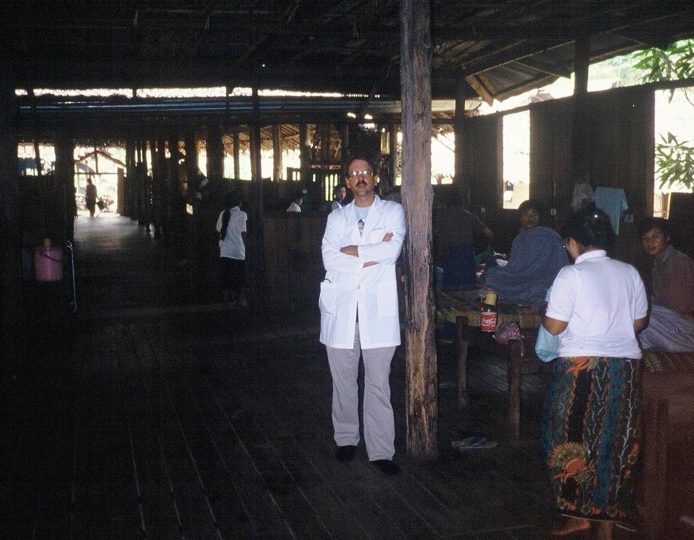 Given his background, training and experience, Dr. Mueller recognized a unique opportunity to help the desperate Karens. With his wife's support, he set out on what proved to be a 25 year odyssey.
Given his background, training and experience, Dr. Mueller recognized a unique opportunity to help the desperate Karens. With his wife's support, he set out on what proved to be a 25 year odyssey.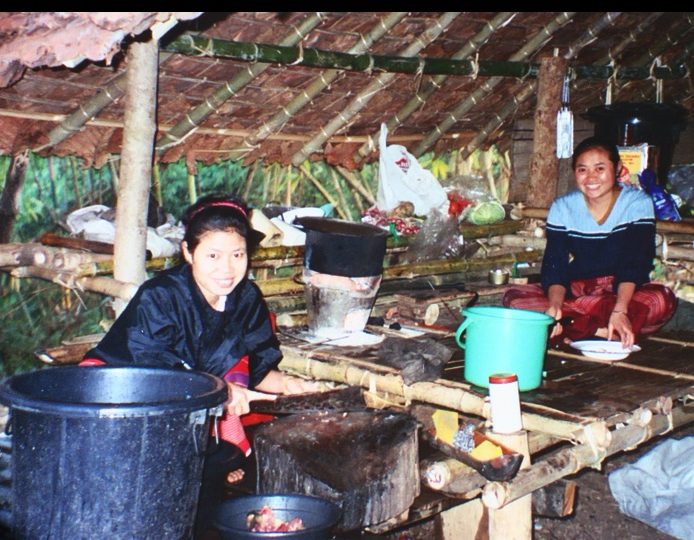 Despite desperate circumstances, the Karens were happy, clean and well groomed. The meals were delicious and Dr. Mueller never became ill after eating their food.
Despite desperate circumstances, the Karens were happy, clean and well groomed. The meals were delicious and Dr. Mueller never became ill after eating their food.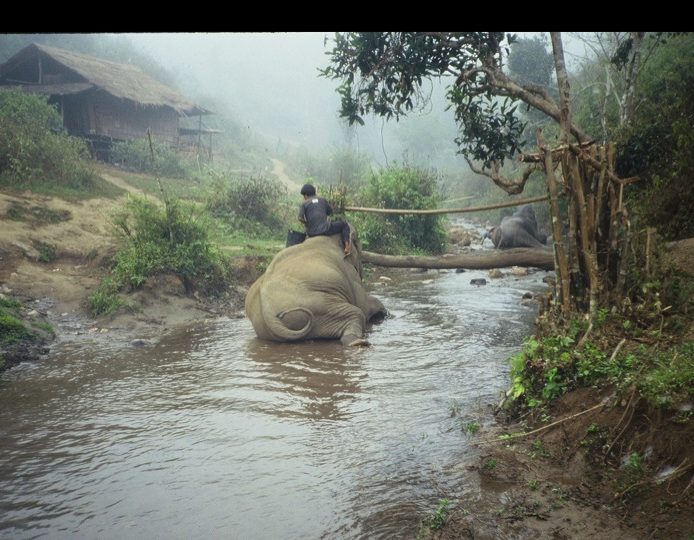 Life with the Karens provided many delightful scenes rarely witnessed by Westerners.
Life with the Karens provided many delightful scenes rarely witnessed by Westerners.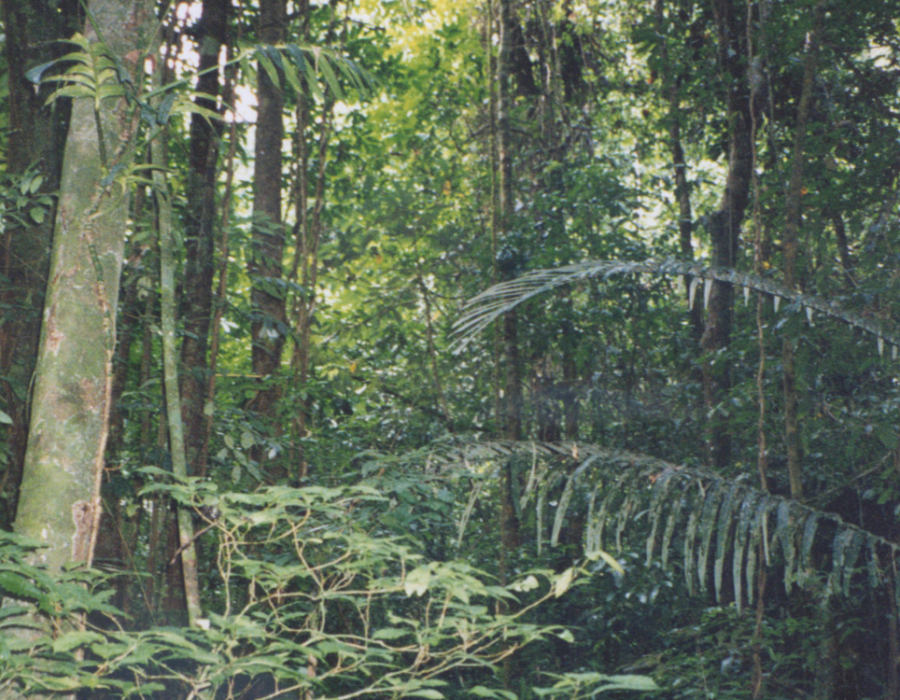 Once outside a jungle village, trekking off of the main trail was not realistic.
Once outside a jungle village, trekking off of the main trail was not realistic.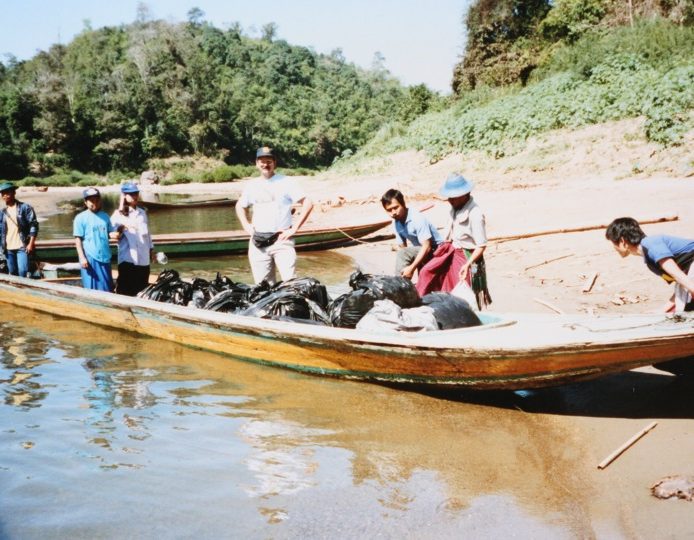 Dr. Mueller participated in delivering shipped-in donated clothing from local churches in California to recent victims of Burmese Army attacks.
Dr. Mueller participated in delivering shipped-in donated clothing from local churches in California to recent victims of Burmese Army attacks.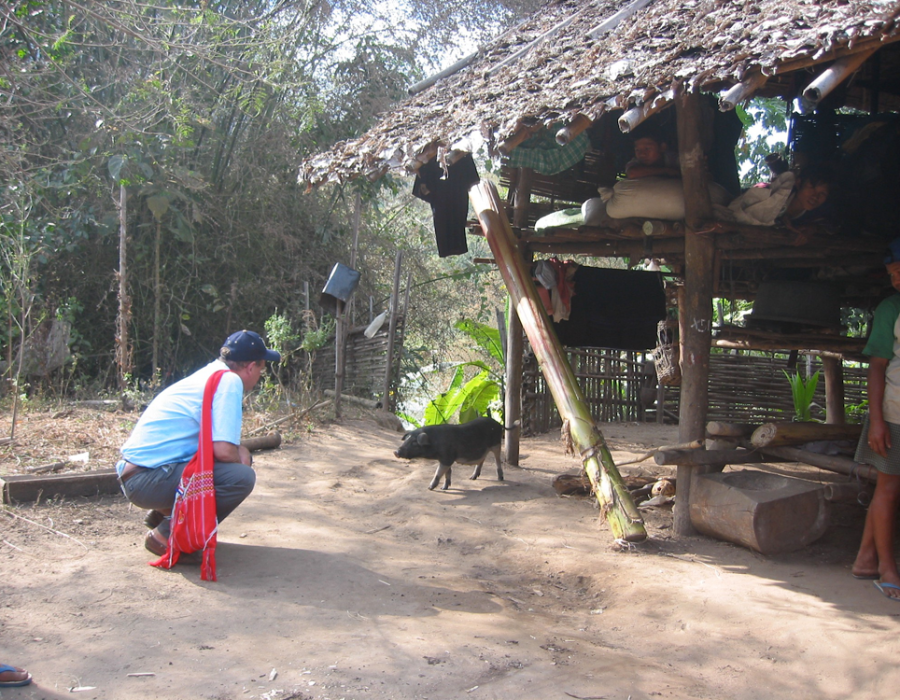 Dr. Mueller was entertained by the docile village pigs, while missing his dog back home.
Dr. Mueller was entertained by the docile village pigs, while missing his dog back home.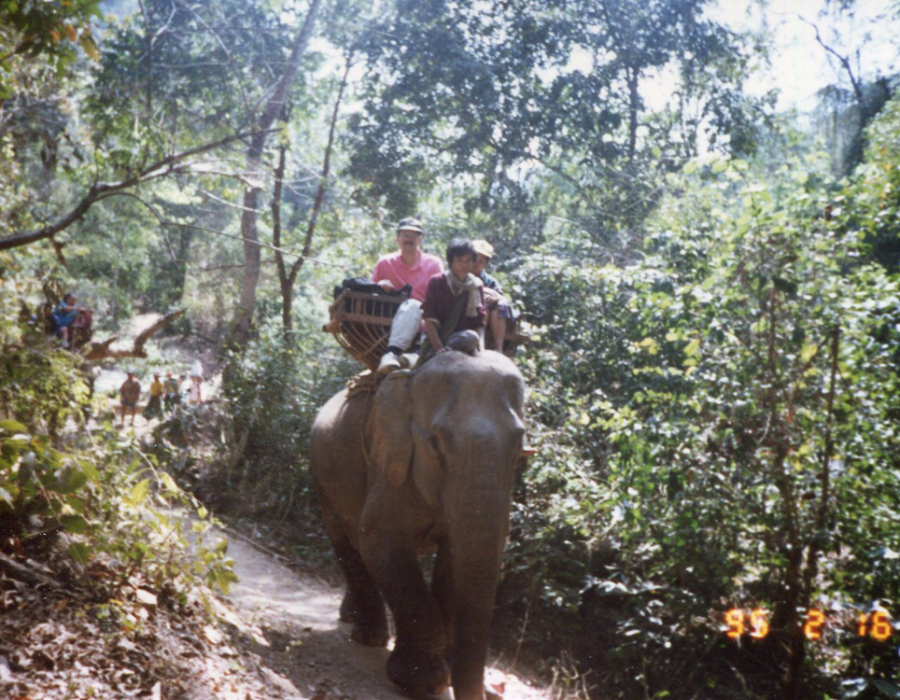 Another fringe benefit of jungle life - free elephant rides.
Another fringe benefit of jungle life - free elephant rides.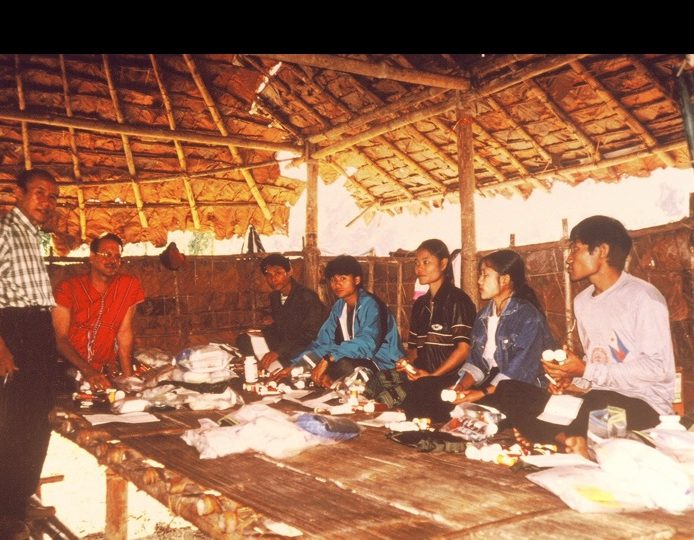 Unfortunately, the Karen's hospital and most of the Karen's land eventually fell to the Burmese Army. Unable to walk away from the Karens in their darkest hour, with neither a hospital or operating room available to perform surgery, Dr. Mueller instead focused on training Karen medics.
Unfortunately, the Karen's hospital and most of the Karen's land eventually fell to the Burmese Army. Unable to walk away from the Karens in their darkest hour, with neither a hospital or operating room available to perform surgery, Dr. Mueller instead focused on training Karen medics.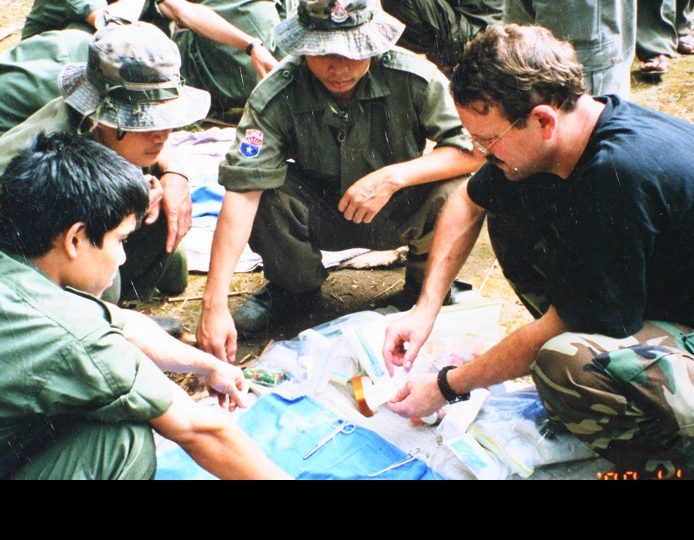 Dr. Mueller's students included both civilian and soldier medics.
Dr. Mueller's students included both civilian and soldier medics.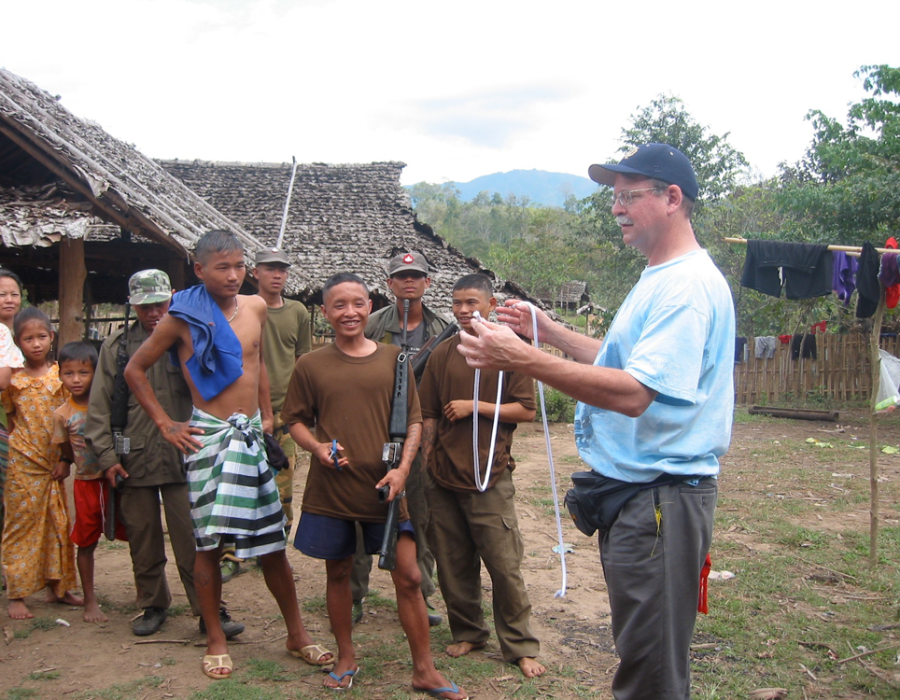 Dr. Mueller has been a magician since childhood and brought this nonverbal form of entertainment to the Karens wherever he found them. Most had no access to TV or movies nor had ever seen live professional magic before.
Dr. Mueller has been a magician since childhood and brought this nonverbal form of entertainment to the Karens wherever he found them. Most had no access to TV or movies nor had ever seen live professional magic before.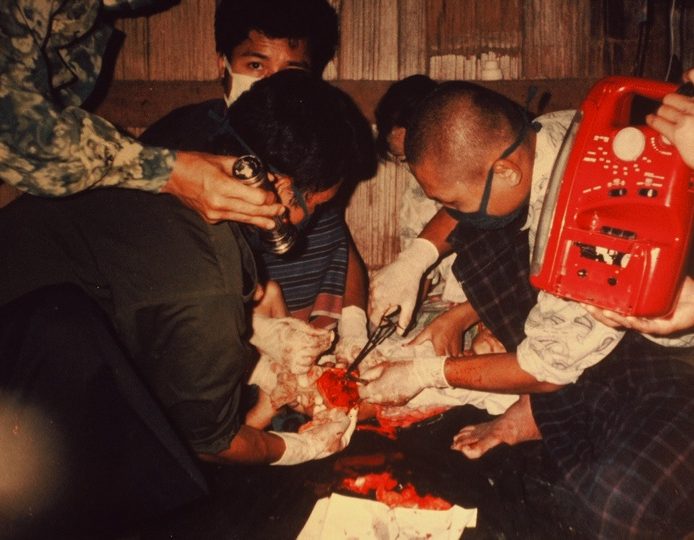 Although their hospital was gone, landmine victims still required lifesaving operations performed in poorly equipped jungle huts.
Although their hospital was gone, landmine victims still required lifesaving operations performed in poorly equipped jungle huts.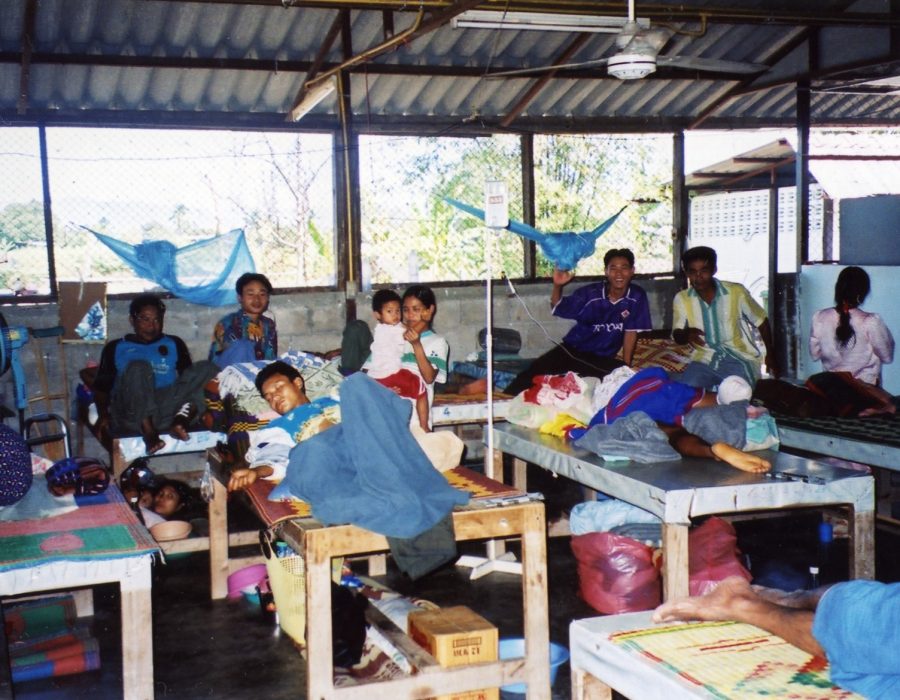 The surgery ward was a single room open air facility where the patients' families slept under the wooden beds.
The surgery ward was a single room open air facility where the patients' families slept under the wooden beds.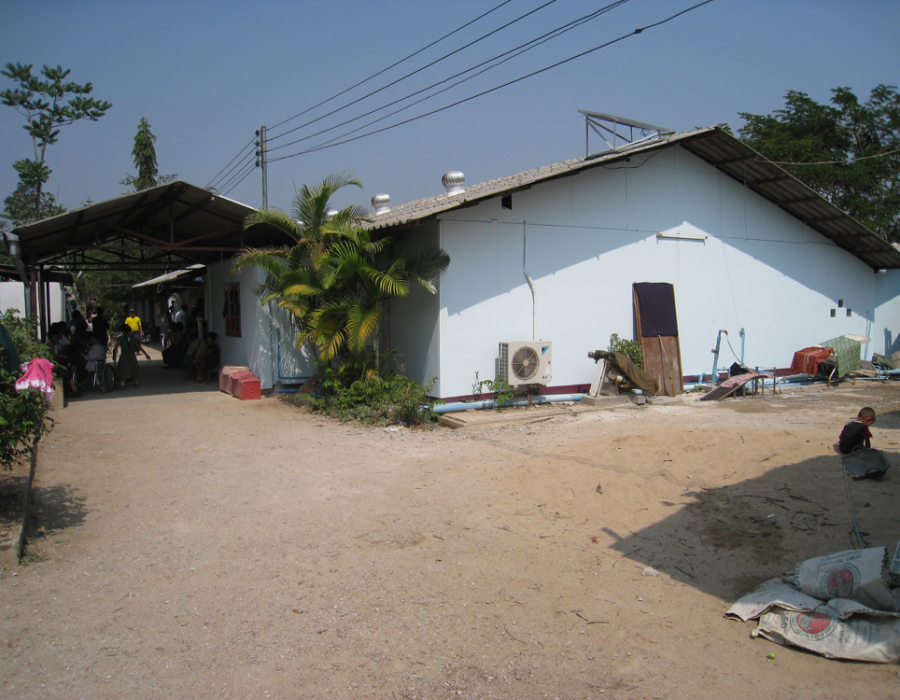 Initial success of the new surgery program motivated a NGO donor group to rebuild and enlarge the structure.
Initial success of the new surgery program motivated a NGO donor group to rebuild and enlarge the structure.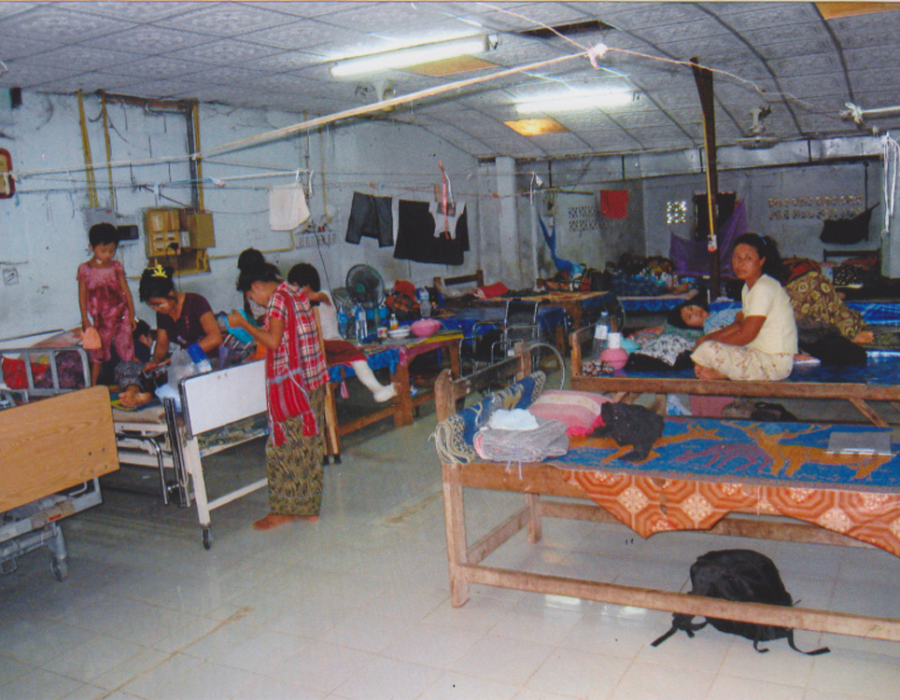 The floor space for patients was tripled and a tile floor made cleaning easier and more efficient.
The floor space for patients was tripled and a tile floor made cleaning easier and more efficient.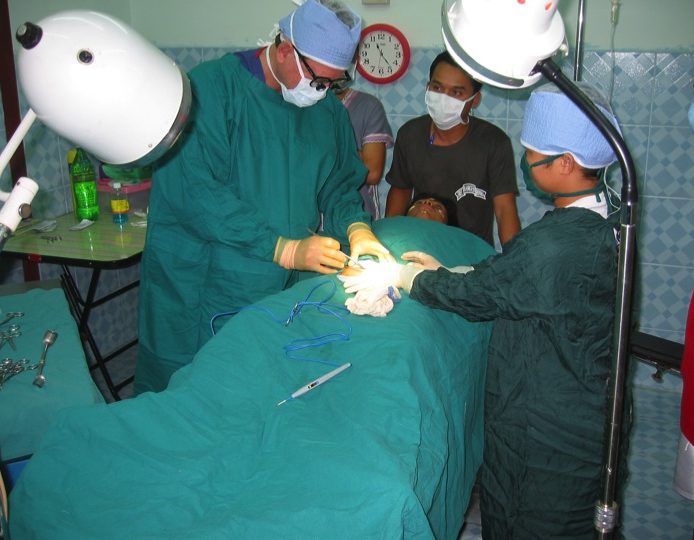 A new OR was constructed and all the basic equipment and supplies necessary for safe and effective surgery was gathered by Dr. Mueller. Within a short period, Dr. Mueller was performing 20-30 major operations during his annual three-week trip and his trained medics operated on hundreds more annually with less complicated problems during his absence.
A new OR was constructed and all the basic equipment and supplies necessary for safe and effective surgery was gathered by Dr. Mueller. Within a short period, Dr. Mueller was performing 20-30 major operations during his annual three-week trip and his trained medics operated on hundreds more annually with less complicated problems during his absence.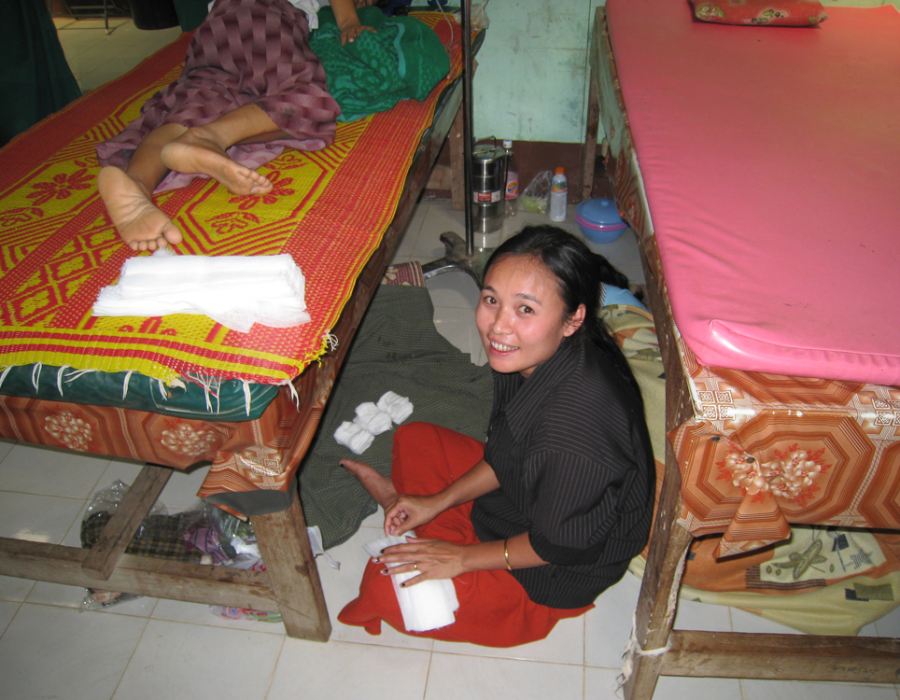 The nurses helped make inexpensive sterile dressings from large rolls of gauze.
The nurses helped make inexpensive sterile dressings from large rolls of gauze.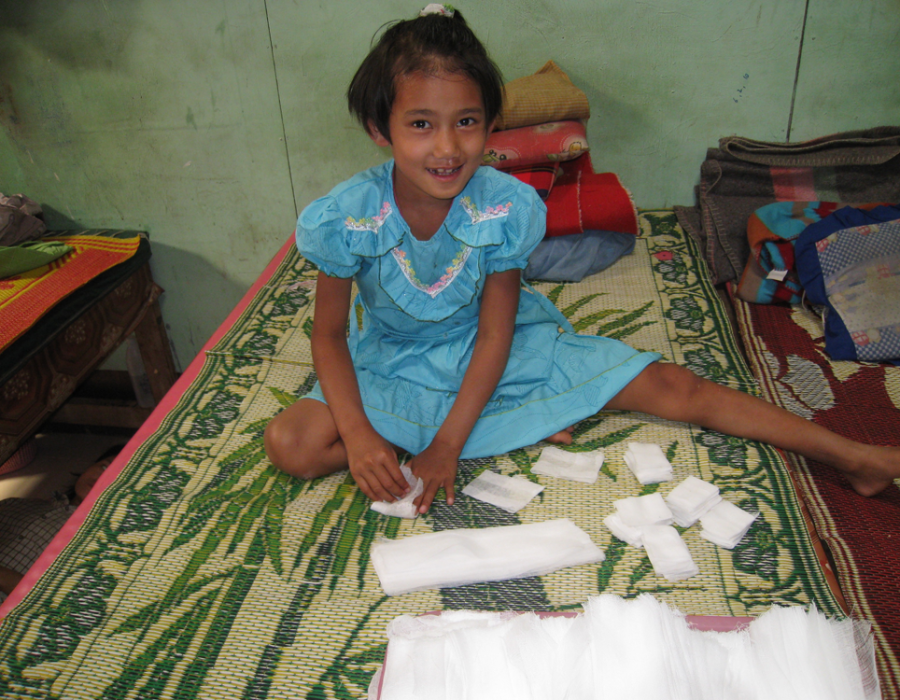 Grateful family members also eagerly helped with routine hospital chores.
Grateful family members also eagerly helped with routine hospital chores.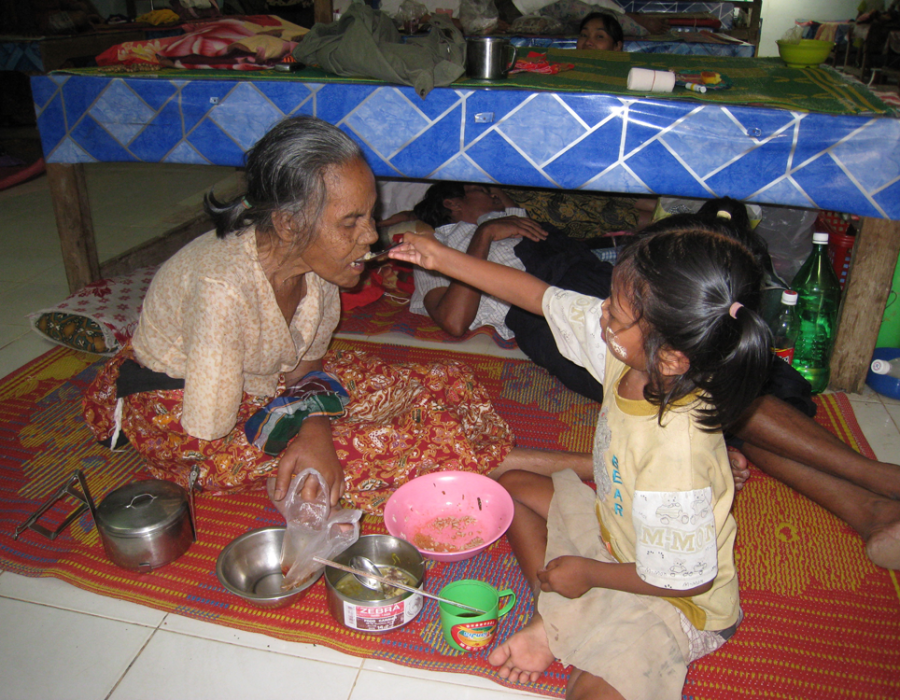 This grandmother suffered a venomous snakebite to her right arm resulting in gangrene up to her elbow. Having heard about Dr. Mueller and the Mae Tao Clinic, she travelled for five weeks with her son and granddaughter to the border. The day after Dr. Mueller amputated her arm, the severe continuous pain was gone. The cute little girl was always there to help with a smile.
This grandmother suffered a venomous snakebite to her right arm resulting in gangrene up to her elbow. Having heard about Dr. Mueller and the Mae Tao Clinic, she travelled for five weeks with her son and granddaughter to the border. The day after Dr. Mueller amputated her arm, the severe continuous pain was gone. The cute little girl was always there to help with a smile.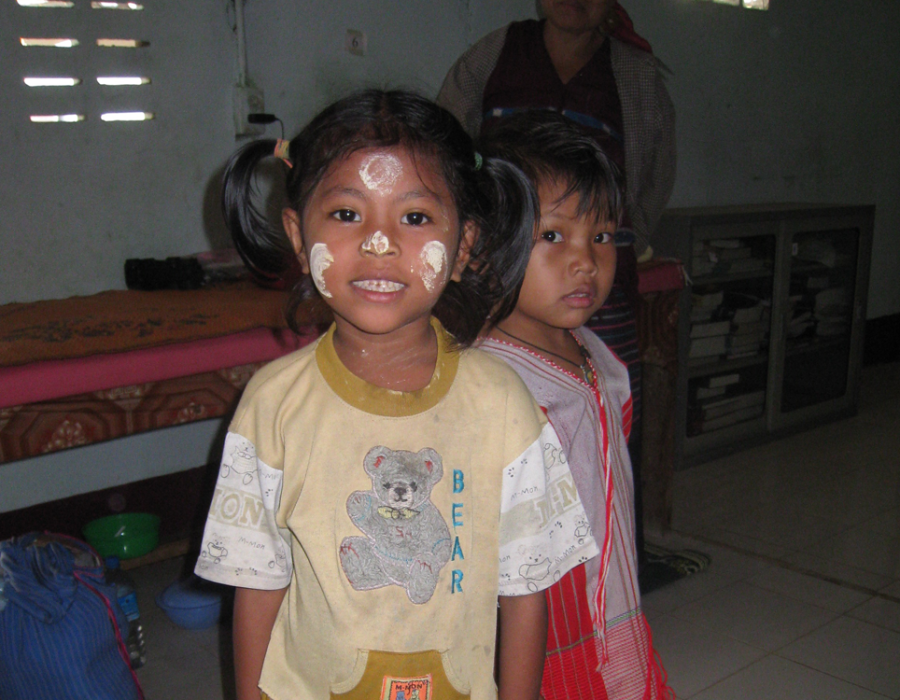 The girl's cheek decoration is dried ground bark that also served as a sunscreen.
The girl's cheek decoration is dried ground bark that also served as a sunscreen.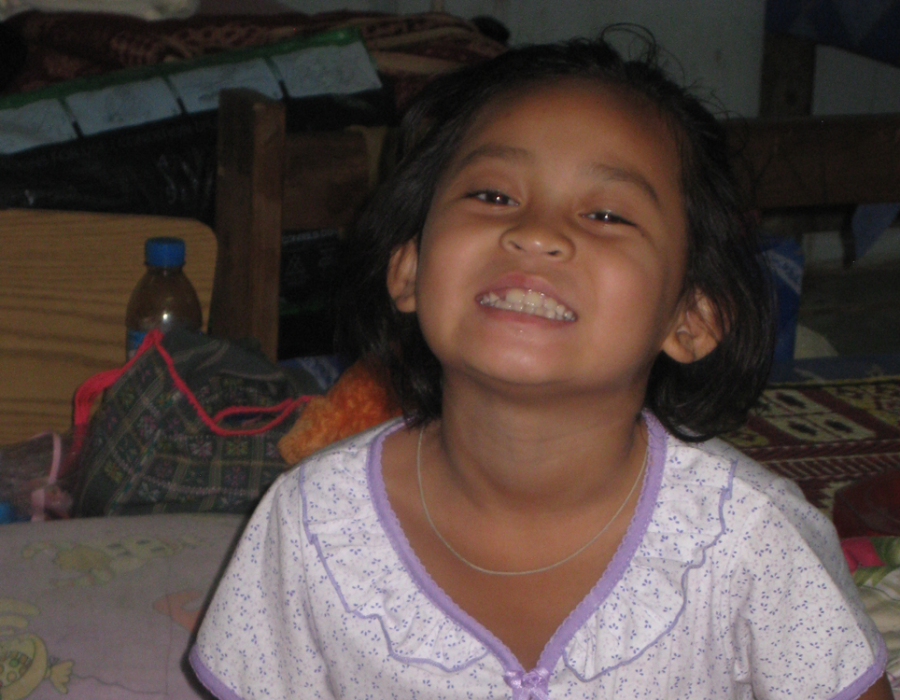 My refugee pediatric patients could have been children anywhere.
My refugee pediatric patients could have been children anywhere.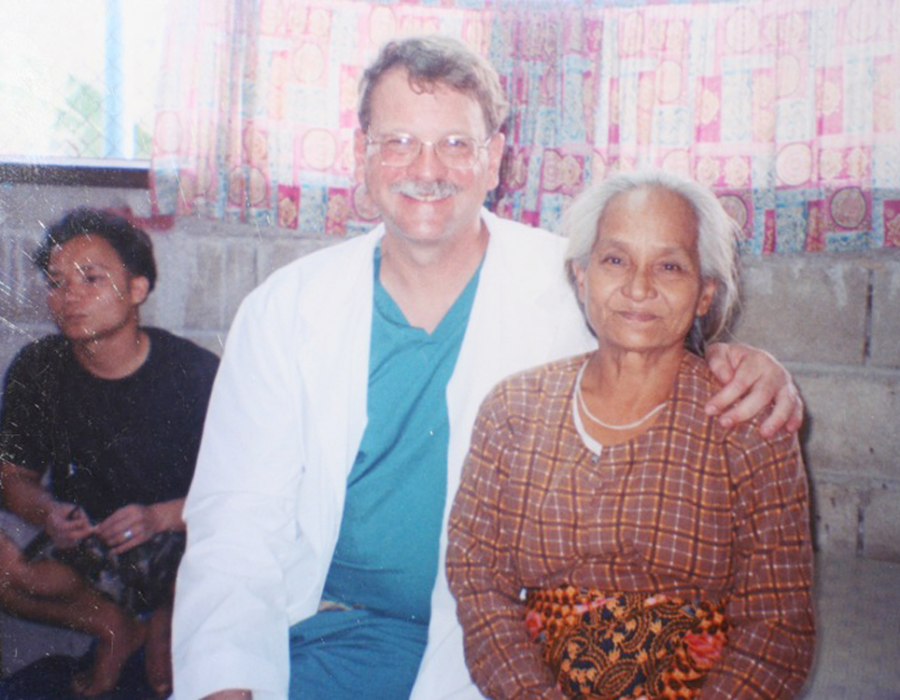 Dr. Mueller's patients ranged in age from three to eighty.
Dr. Mueller's patients ranged in age from three to eighty.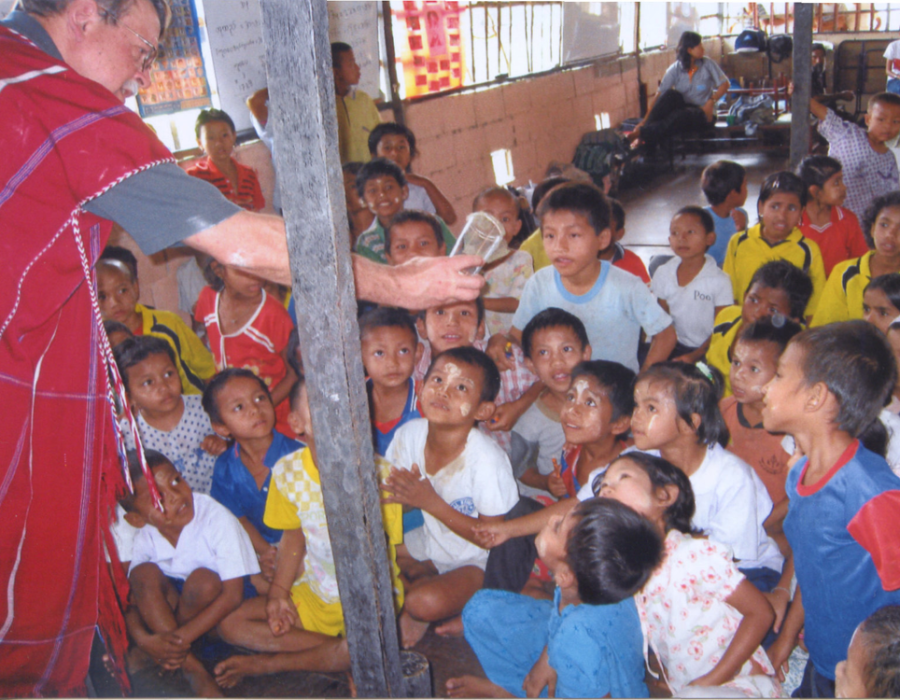 Dr. Mueller performed many magic shows to audiences ranging in size from three to three hundred. Most of the refugees had never seen real magic before and the delight and amazement that shone on their faces was priceless.
Dr. Mueller performed many magic shows to audiences ranging in size from three to three hundred. Most of the refugees had never seen real magic before and the delight and amazement that shone on their faces was priceless.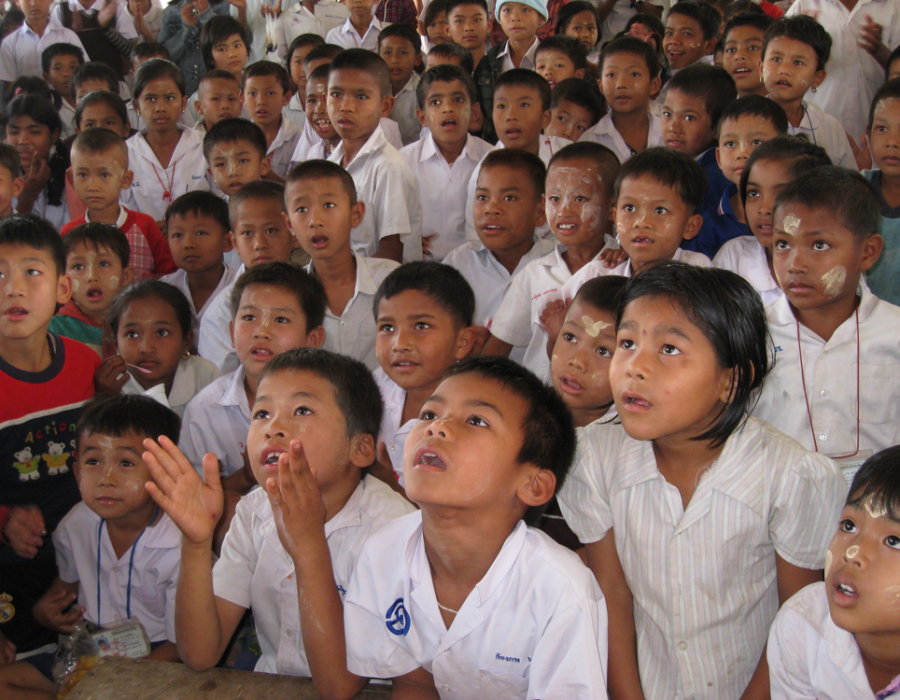 Note how clean and well- groomed my pediatric audience was!
Note how clean and well- groomed my pediatric audience was!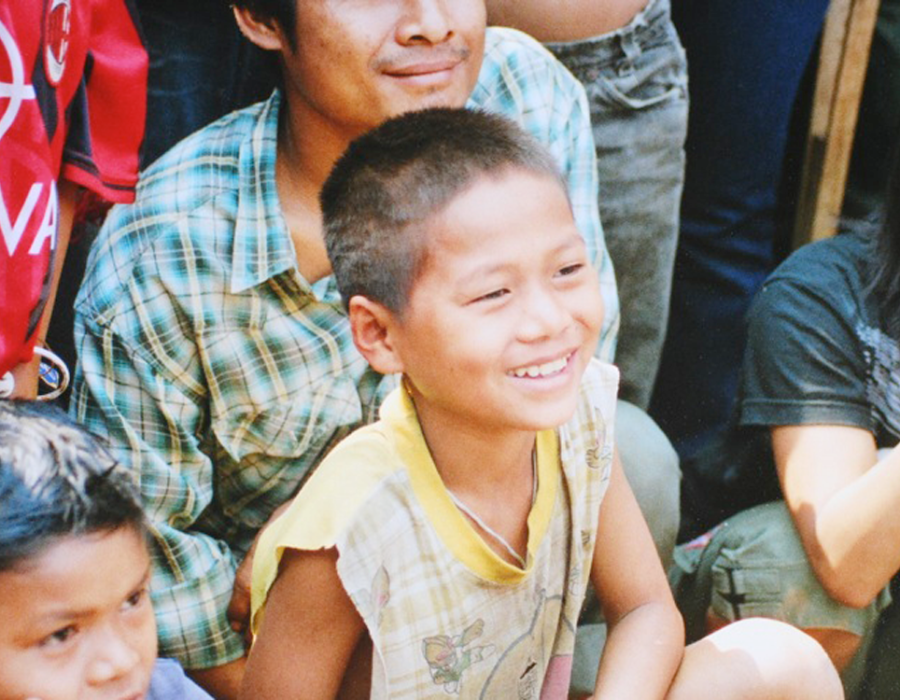 The expression of amazement and delight on a child’s face is universal.
The expression of amazement and delight on a child’s face is universal.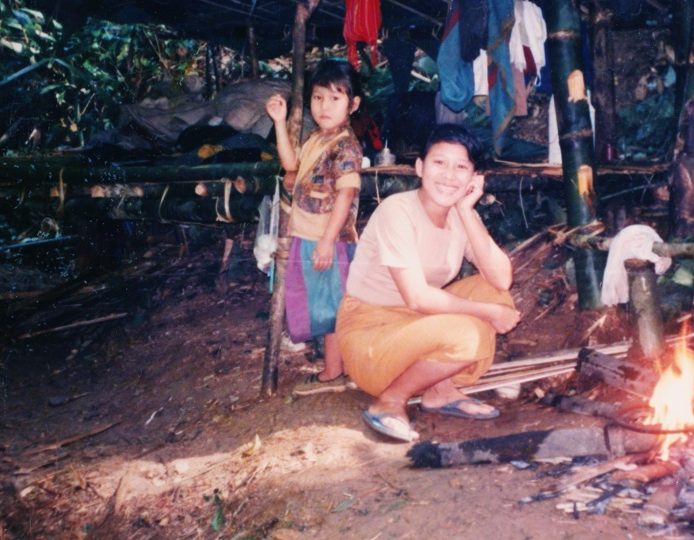 This Karen woman's village was attacked by the Burmese Army two weeks earlier. Successfully escaping enslavement or death and after a week on the run, the surviving villagers chose a hide site in the deep jungle. Within a week, all were sleeping off the dirt on elevated bamboo lean-tos and dry thanks to thatched leaf roofs. Dr. Mueller smiled at her and she, happy to be alive and safe with her daughter, returned the gesture as she cooked dinner.
This Karen woman's village was attacked by the Burmese Army two weeks earlier. Successfully escaping enslavement or death and after a week on the run, the surviving villagers chose a hide site in the deep jungle. Within a week, all were sleeping off the dirt on elevated bamboo lean-tos and dry thanks to thatched leaf roofs. Dr. Mueller smiled at her and she, happy to be alive and safe with her daughter, returned the gesture as she cooked dinner.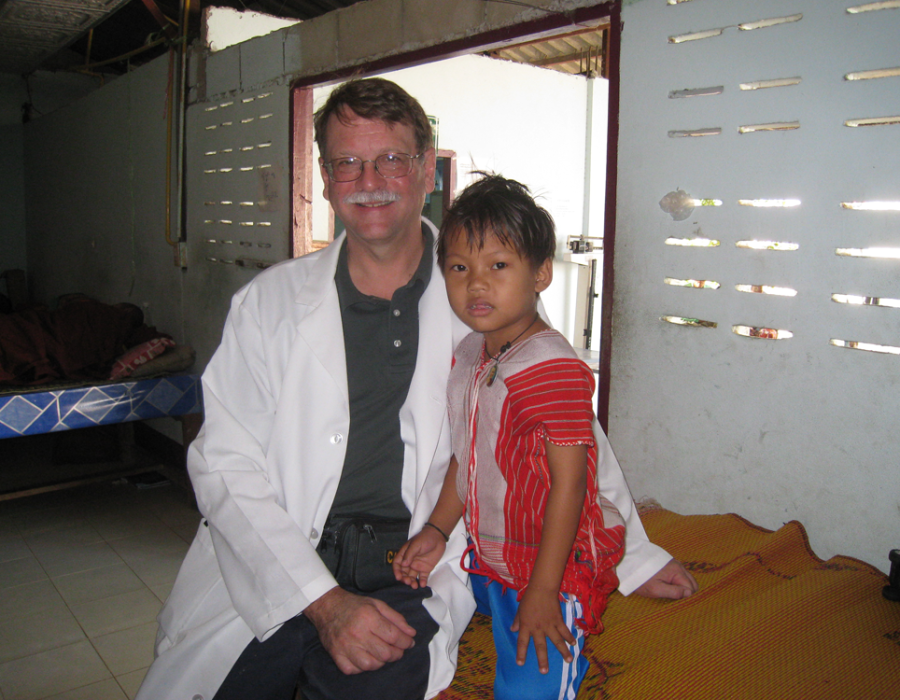 Like this young patient, over the years Dr. Mueller operated on hundreds of boys and men with symptomatic groin hernias. His operation eliminated the mass and its accompanying symptoms including chronic pain and the risk of potential life-threatening complications. From the perspective of a seasoned surgeon, Dr. Mueller explains in easily understandable layman's terms his successful approaches in remote settings to many patients with problems treatable with major surgery. Dr. Mueller also shares with his readers the emotional and spiritual journeys that accompany the mission of caring for and helping the Lord to heal the least of His brethren.
Like this young patient, over the years Dr. Mueller operated on hundreds of boys and men with symptomatic groin hernias. His operation eliminated the mass and its accompanying symptoms including chronic pain and the risk of potential life-threatening complications. From the perspective of a seasoned surgeon, Dr. Mueller explains in easily understandable layman's terms his successful approaches in remote settings to many patients with problems treatable with major surgery. Dr. Mueller also shares with his readers the emotional and spiritual journeys that accompany the mission of caring for and helping the Lord to heal the least of His brethren.